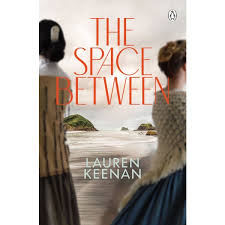The Space Between, by Lauren Keenan.
Early 1860: the
British Crown has signed a Treaty with Maori and colonisation is in full
swing; settlers by the shipload have
been arriving under the auspices of the New Zealand Company, new government
agents (of a kind) charged with the immigration of those wishing to throw off
the shackles of the stifling class system in Britain, hoping to make something
of themselves and their families, and prepared to work hard to have a better
life. If only, for the class system has
travelled on the ships with them: it
will take many, many years to shake off humble origins.
In New Plymouth (called Ngamotu by those Maoris), a
gentleman and his mother and shamefully spinster sister are trying their hand
at farming. George Farrington has been
forced to leave England supposedly because their father lost all their money,
then died – what was a man to do? The
Colonies seemed to be the only answer for someone so short of cash - the
problem being that George was not a natural-born farmer, or a lover of the
land, and his sister Frances, jilted cruelly by a ne’er-do-well called Henry
White 12 years before has been raised as genteel – it is an entirely new
experience for her to have to tend to fowls and milk cows, for their mother
refuses to do anything that does not befit her station.
And to add insult to grievous injury, who should Frances
meet outside Thorpe’s General Store but Henry White himself, there to meet his
Maori wife Mataria – and Mataria shouldn’t have been there anyway because all Maori
need a pass issued by the Military; they
are undergoing the laborious, humiliating process after their trip for supplies
to the store. Life has suddenly taken an
equally harrowing turn for Frances and when brother George sees Henry and his
wife talking with Frances he contrives to get the couple put in jail – no pass,
no freedom!
A military conflict is brewing, too: the settlers want to expand the boundaries of
New Plymouth and are dealing with a Maori representative who does not have
tribal permission to sell any more land, but such is their desire to own more
acres, they are arrogant in their belief in the rightness of their cause. Of course!
Lauren Keenan has portrayed events of the time with great
clarity backed by strong historical research and her own tribal affiliation to
Te Atiawa ke Taranaki. She creates a
superb portrait of a time that contained horrors that we can barely guess at –
and the frail, perennial flowers of compassion, hope and affection that are
essential for all of us to carry on. SIX STARS.


No comments:
Post a Comment